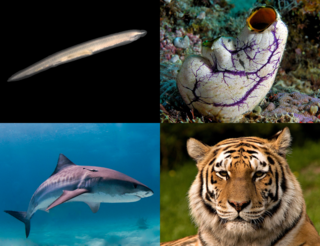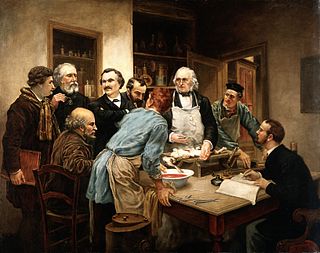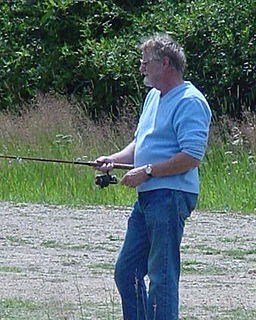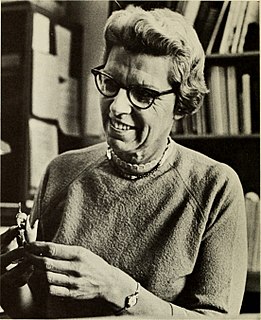Related Research Articles

A chordate is an animal of the phylum Chordata. All chordates possess five synapomorphies, or primary characteristics, at some point during their larval or adulthood stages that distinguish them from all other taxa. These five synapomorphies include a notochord, dorsal hollow nerve cord, endostyle or thyroid, pharyngeal slits, and a post-anal tail. The name “chordate” comes from the first of these synapomorphies, the notochord, which plays a significant role in chordate structure and movement. Chordates are also bilaterally symmetric, have a coelom, possess a circulatory system, and exhibit metameric segmentation.

Interdisciplinarity or interdisciplinary studies involves the combination of two or more academic disciplines into one activity. It draws knowledge from several other fields like sociology, anthropology, psychology, economics etc. It is about creating something by thinking across boundaries. It is related to an interdiscipline or an interdisciplinary field, which is an organizational unit that crosses traditional boundaries between academic disciplines or schools of thought, as new needs and professions emerge. Large engineering teams are usually interdisciplinary, as a power station or mobile phone or other project requires the melding of several specialties. However, the term "interdisciplinary" is sometimes confined to academic settings.

Physiology is the scientific study of functions and mechanisms in a living system. As a sub-discipline of biology, physiology focuses on how organisms, organ systems, individual organs, cells, and biomolecules carry out the chemical and physical functions in a living system. According to the classes of organisms, the field can be divided into medical physiology, animal physiology, plant physiology, cell physiology, and comparative physiology.
Zoology is the branch of biology that studies the animal kingdom, including the structure, embryology, evolution, classification, habits, and distribution of all animals, both living and extinct, and how they interact with their ecosystems. The term is derived from Ancient Greek ζῷον, zōion ('animal'), and λόγος, logos.

Karl Spencer Lashley was a psychologist and behaviorist remembered for his contributions to the study of learning and memory. A Review of General Psychology survey, published in 2002, ranked Lashley as the 61st most cited psychologist of the 20th century.

Charles Henry Turner was an American zoologist, educator, and comparative psychologist, known for his studies on the behavior of insects, particularly bees and ants. Born in Cincinnati, Ohio, Turner was the first African American to receive a graduate degree at the University of Cincinnati and most likely the first African American to earn a PhD from the University of Chicago. Being a black man in the eighteen hundreds he was a victim of racism. He spent most of his career as a high school teacher in Sumner High School in St. Louis.

The European Molecular Biology Organization (EMBO) is a professional, non-profit organization of more than 1,800 life scientists. Its goal is to promote research in life science and enable international exchange between scientists. It co-funds courses, workshops and conferences, publishes five scientific journals and supports individual scientists. The organization was founded in 1964 and is a founding member of the Initiative for Science in Europe. As of 2022 the Director of EMBO is Fiona Watt, a stem cell researcher, professor at King's College London and a group leader at EMBL.

A body plan, Bauplan, or ground plan is a set of morphological features common to many members of a phylum of animals. The vertebrates share one body plan, while invertebrates have many.
Comparative physiology is a subdiscipline of physiology that studies and exploits the diversity of functional characteristics of various kinds of organisms. It is closely related to evolutionary physiology and environmental physiology. Many universities offer undergraduate courses that cover comparative aspects of animal physiology. According to Clifford Ladd Prosser, "Comparative Physiology is not so much a defined discipline as a viewpoint, a philosophy."

Evolutionary physiology is the study of the biological evolution of physiological structures and processes; that is, the manner in which the functional characteristics of individuals in a population of organisms have responded to natural selection across multiple generations during the history of the population. It is a sub-discipline of both physiology and evolutionary biology. Practitioners in the field come from a variety of backgrounds, including physiology, evolutionary biology, ecology, and genetics.

Integrative and Comparative Biology is the scientific journal for the Society for Integrative and Comparative Biology. Prior to volume 42 (2002), the journal was known as American Zoologist ISSN 0003-1569.

Theodore Holmes Bullock is one of the founding fathers of neuroethology. During a career spanning nearly seven decades, this American academic was esteemed both as a pioneering and influential neuroscientist, examining the physiology and evolution of the nervous system across organizational levels, and as a champion of the comparative approach, studying species from nearly all major animal groups—coelenterates, annelids, arthropods, echinoderms, molluscs, and chordates.
Sara J. Shettleworth is an American-born, Canadian experimental psychologist and zoologist. Her research focuses on animal cognition. She is professor emerita of psychology and ecology and evolutionary biology at the University of Toronto.

Denis Louis Blackmore (1943–2022) was an American mathematician and a full professor of the Department of Mathematical Sciences at the New Jersey Institute of Technology. He was also one of the founding members of the Center for Applied Mathematics and Statistics at NJIT. Dr. Blackmore was mainly known for his many contributions in the fields of Dynamical Systems and Differential Topology. In addition to this, he had many contributions in other fields of Applied Mathematics, Physics, Biology, and Engineering.
Brian Keith Hall is the George S. Campbell Professor of Biology and University Research Professor Emeritus at Dalhousie University in Halifax, Nova Scotia. Hall has researched and extensively written on bone and cartilage formation in developing vertebrate embryos. He is an active participant in the evolutionary developmental biology (EVO-DEVO) debate on the nature and mechanisms of animal body plan formation. Hall has proposed that the neural crest tissue of vertebrates may be viewed as a fourth embryonic germ layer. As such, the neural crest - in Hall's view - plays a role equivalent to that of the endoderm, mesoderm, and ectoderm of bilaterian development and is a definitive feature of vertebrates. As such, vertebrates are the only quadroblastic, rather than triploblastic bilaterian animals. In vertebrates the neural crest serves to integrate the somatic division and visceral division together via a wide range novel vertebrate tissues.

Many mammalian species have developed keratinized penile spines along the glans and/or shaft, which may be involved in sexual selection. These spines have been described as being simple, single-pointed structures (macaques) or complex with two or three points per spine (strepsirrhines). Penile spine morphology may be related to mating system.
Marvalee Hendricks Wake is an American zoologist and professor at the University of California, Berkeley, known for her research in the biology of caecilians and vertebrate development and evolution. A 1988 Guggenheim Fellow, she has served as president of the American Institute of Biological Sciences, the American Society of Ichthyologists and Herpetologists, Society for Integrative and Comparative Biology, International Union of Biological Sciences, and the International Society of Vertebrate Morphology. She is a fellow of the American Association for the Advancement of Science and the California Academy of Sciences, and is a member of the American Academy of Arts and Sciences.

David Crews is the Ashbel Smith Professor of Zoology and Psychology at the University of Texas at Austin. He has been a pioneer in several areas of reproductive biology, including evolution of sexual behavior and differentiation, neural and phenotypic plasticity, and the role of endocrine disruptors on brain and behavior.
Membership of the European Molecular Biology Organization (EMBO) is an award granted by the European Molecular Biology Organization (EMBO) in recognition of "research excellence and the outstanding achievements made by a life scientist".

Dorothy Elizabeth Bliss was an American carcinologist and curator of invertebrates at the American Museum of Natural History, with which she was associated for over 30 years. She was known as a pioneer in the field of hormonal control in crustaceans. She was editor-in-chief of the 10-volume series The Biology of Crustacea, and author of the popular book Shrimps, Lobsters and Crabs. She served as president of the American Society of Zoologists and was a fellow of the American Association for the Advancement of Science.
References
- 1 2 3 4 5 Pennisi, Elizabeth (10 January 2014), "Once failing biology society thrives as it nurtures new disciplines", Science , 343 (6167): 129, doi:10.1126/science.343.6167.129, PMID 24408411 .
- ↑ Quinn, C. Edward (1982), "Ancestry and beginnings: The early history of the American Society of Zoologists", American Zoologist , 22 (4): 735–748, doi: 10.1093/icb/22.4.735 .
- ↑ McCain, Katherine W. (April 2010), "Core journal literatures and persistent research themes in an emerging interdisciplinary field: Exploring the literature of evolutionary developmental biology", Journal of Informetrics, 4 (2): 157–165, doi:10.1016/j.joi.2009.11.004 .
- ↑ Schmidt, Diane; Davis, Elisabeth B. (2001), Using The Biological Literature: A Practical Guide, Revised And Expanded, Books in Library and Information Science, vol. 60 (3rd ed.), CRC Press, p. 264, ISBN 9780824741716 .